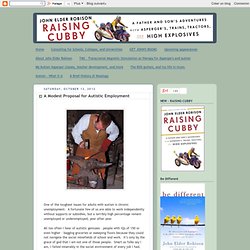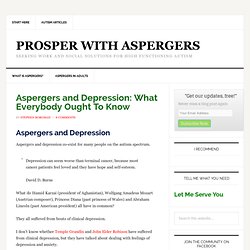

A Christian Minister Deals with Asperger's SyndromeStart2Finish Blog. This past May, I had a bombshell drop on me.

I was diagnosed with Asperger’s syndrome. For those of you who, like I did, are now asking, “What is Asperger’s?” Let me allow smarter people to define it. Say, the Mayo clinic? Asperger’s syndrome is a developmental disorder that affects a person’s ability to socialize and communicate effectively with others. In the aftermath of the diagnosis, my emotions ran an entire gamut. But the relief finally gave way to anger. I was angry at myself for not discovering this information sooner. Most of all, I was angry at God. I was angry at God because I felt for quite a while that this new discovery might cost me my career as a minister. There is within all of us a desire to be normal. Carly's Café - Experience Autism Through Carly's Eyes. BBC - My Autism and Me - Watch the Beautifully... - Aspienaut - WIRED differently.
New DSM-5 Criteria For Autism. Study Support Yoga for Kids with Autism. October 15, 2012 Yoga could help children with autism cope with behavioral problems, according to a recent study published in the American Journal of Occupational Therapy.

The study, which tested the effectiveness of a school yoga program for children with autism spectrum disorders, showed that those who participated in yoga behaved better than children who didn’t participate in the program, according to their teachers’ assessments. Children in the yoga group practiced yoga daily for 16 weeks through the Get Ready to Learn Yoga program in place at a school in the Bronx. Researches believe yoga is effective for children with autism spectrum disorder because it gives them an outlet to deal with anxiety and stress. “We know that anxiety fuels a lot of the negative behavior, so the yoga program gives them a strategy to cope with it,” Kristie Patten Koenig an assistant professor of occupational therapy at New York University who led the study told Shots, National Public Radio’s health blog. 10 Things 1 Person With Autism Wants You to Accept. Lydia Wayman is a 23-year-old author, speaker, blogger, and advocate from Pittsburgh who has autism.

Her blog, Autistic Speaks, is irresistible reading if you want to get a better sense of what the world looks and feels like from the point of view of at least one very articulate person on the spectrum. This week Lydia has written a touching and insightful guest post for another blogger we like to follow, Michaela Searfoorce, who has invited others in the special needs community to write Top Ten lists. You can read more from Lydia here, and more of Michaela's Top Ten lists here. A Modest Proposal for Autistic Employment.
One of the toughest issues for adults with autism is chronic unemployment.

A fortunate few of us are able to work independently without supports or subsidies, but a terribly high percentage remain unemployed or underemployed, year after year. All too often I hear of autistic geniuses – people with IQs of 150 or even higher – bagging groceries or sweeping floors because they could not navigate the social minefields of school and work. It’s only by the grace of god that I am not one of those people. Smart as folks say I am, I failed miserably in the social environment of every job I had. That’s despite my technical competence. The Social Mind at Work. This article, written Michelle Garcia Winner, MA, CCC-SLP, and Pamela Crooke, Ph.D., CCC-SLP, authors of Social Thinking at Work: Why Should I Care?

, is tailored to Human Resource managers, counselors, psychologists and therapists who support adults in the workplace. “Social thinking” is how we think about our own and others’ minds—and not everyone is born with the same natural ability. When people at work say they were “talking around the water cooler” or “making small talk,” what do they really mean? Why is it that someone can come up with a brilliant strategy, but be unable to effectively communicate the idea in a meeting with fellow team members? How is it that a person can be recognized for his productivity on the job, but never is included in the lunchroom social chatter?
Many people with highly developed minds related to their professions are not nearly as gifted in how they relate to others’ minds. Aspergers Traits (Women, Females, Girls) 1) We are deep philosophical thinkers and writers; gifted in the sense of our level of thinking. Perhaps poets, professors, authors, or avid readers of nonfictional genre. I don’t believe you can have Aspergers without being highly-intelligent by mainstream standards. Perhaps that is part of the issue at hand, the extreme intelligence leading to an over-active mind and high anxiety. We see things at multiple levels, including our own place in the world and our own thinking processes. We analyze our existence, the meaning of life, the meaning of everything continually. 2) We are innocent, naive, and honest. 3) We are escape artists. 4) We have comorbid attributes of other syndromes/disorders/conditions. 5) We learn that to fit in we have to “fake” it. 6) We seek refuge at home or at a safe place. 7) We are sensitive. 8) We are ourselves and we aren’t ourselves. 9) Feelings and other people’s actions are confusing.
Halloween Tips For Kids With Sensory Sensitivities - Brain Balance Achievement Centers. Aspergers and Depression: What Everybody Ought To Know. Aspergers and Depression Aspergers and depression co-exist for many people on the autism spectrum.

Depression can seem worse than terminal cancer, because most cancer patients feel loved and they have hope and self-esteem.David D. Burns What do Hamid Karzai (president of Aghanistan), Wolfgang Amadeus Mozart (Austrian composer), Princess Diana (past princess of Wales) and Abraham Lincoln (past American president) all have in common?
They all suffered from bouts of clinical depression.